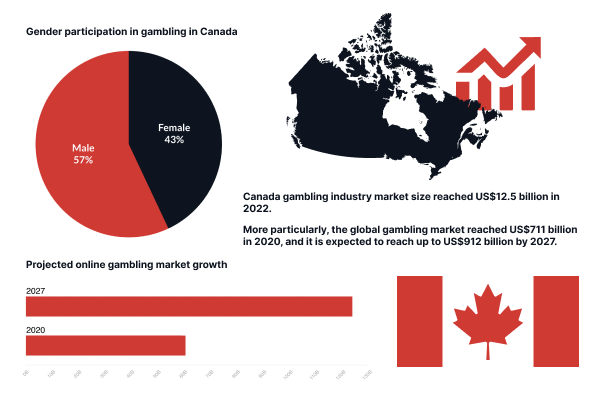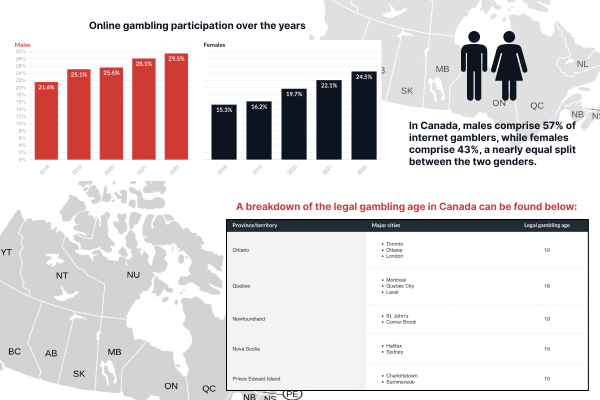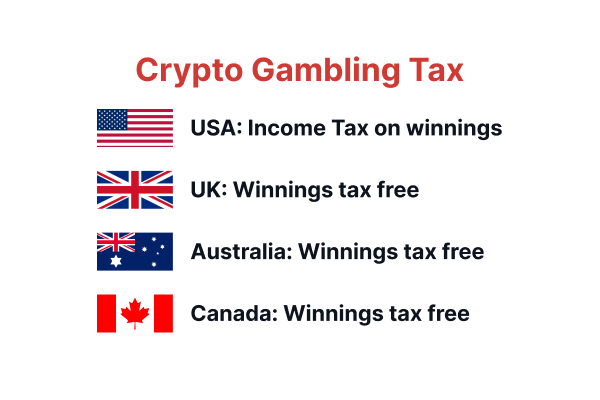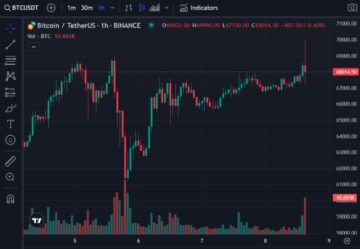Dec 25, 2026


Cryptocurrency turned out to be the perfect missing piece in the world of online gambling. The idea of Bitcoin, Ethereum, or other blockchain currencies is to ease and quicken the transfer of funds, which makes it one of the best things that have ever happened to the iGaming industry.
This form of financial transaction offers several benefits for casino players as long as it aligns with Canadian gambling laws, for example, improved security, faster and higher payouts, anonymity, and low fees. Cryptocurrency is highly portable, signifying that customers can conveniently access their funds regardless of their global location. Gambling operators also benefit tenfold from these benefits, so they may offer special rewards for using cryptocurrency, such as the crypto casino no deposit bonus or the $5 deposit.
Canadian online gambling is a heavily regulated industry with strict laws and legal repercussions for not keeping up with them. Because of this harshness on domestic casinos, crypto casinos Canada need to be very particular about compliance with gambling laws in Canada in order to keep functioning. As said by Stan Magidson, CSA Chair and Chair and CEO of the Alberta Securities Commission: “We encourage stakeholders to review this guidance to better understand our expectations of public crypto asset funds. It is important for such funds to clearly understand their existing regulatory obligations given recent events in the crypto market.”
Review of the Main Canadian Gambling Laws
The market size of the Canadian gambling industry was valued at US$12.5 billion in 2022. But this market is just a tiny speck in the significantly larger global industry, predicted to reach US$912 billion by 2027. The global mobile gambling market has a considerable chunk of this value, projected at $123.6 billion for 2027. These growing numbers signify that Canadian gambling laws may get more stringent from here onward to facilitate the security of the exponentially increasing player count.
Within Canada, 48% of people agree that online betting should be allowed, and 74% of gambling businesses want to focus on improving data usage to deliver better services. All of these ventures will only be possible with adequate gambling laws in Canada, which can ensure the upkeep of quality standards. This article will look in-depth into the Canadian online gambling laws that make iGaming possible in the region.
History Facts: Canadian Gambling Laws
• In 1982, the Canadian Criminal Code banned all forms of gambling, and it was not until the 1900s that Canadian gambling laws permitted these games again.
• In the earlier days of gaming laws legalizing gambling in Canada, only a few variations of the games were allowed. Lotteries and raffles were legalized as well, but they could only be used for charitable purposes.
• Bets on horse racing were allowed in 1910 and are still a big part of the Canadian gambling industry today.
• In 1970, the gambling laws in Canada were amended to provide provinces with the authority to set up their own rules and regulations surrounding the gambling industry.
Criminal Code: Gambling Laws in Canada
If anyone wants to dig deeper into the technicalities of whether online gambling is legal in Canada, the Canada Criminal Code is one of the first places to look at. It forms the basis for other gambling laws in Canada and has several critical sections pertaining to gambling in Canada.
Section 201: This section criminalizes being found in a common betting house or running one yourself.
Section 203: This section of the Code makes it a criminal offence to place bets on behalf of another person or conduct a business of placing bets. The crime is punishable with a jail time of up to two years.
Section 205: This section talks about the lawful punishment for lotteries, raffles and other games of chance. Certain variations, such as dice games, are exempted from this ban, as are fairs and exhibitions.
Section 207: This particular section refers to the entities and individuals who do have the right to conduct lotteries legally. It outlines a proper framework these entities must employ for this purpose.
Statistics and Facts About Canadian Gambling Players


Gambling participation for both males and females has increased over the years, with the current player base comprising 57% males and 43% females. According to most Canadian gambling laws, the legal age of gambling in Canada is 19. The only exception to this lower limit rule are lotteries, some of which may accept any player 18 or above. This is also why almost 65% of Canadian gamblers place their bets on lottery tickets, and it is one of Canada’s most popular forms of gambling.
On the other hand, in the Quebec, Alberta, and Winnipeg regions, the legal gambling age is 18. Winnipeg is also the first Canadian city where an in-person casino was opened back in 1989, which makes it highly significant for the Canadian gambling industry. The proliferation of casinos since those early years, combined with the advent of AI technology, is bringing more and more players and casino providers to the gambling scene every day, increasing the need for adequate gambling laws in Canada to be implemented in all provinces.
Licenses of Online Gambling Laws in Canada
Authentic licensing is hands-down the most crucial element of running a casino, online or in-person. There are several renowned gambling licensing agencies throughout the country, which also ensure compliance with Canadian gambling laws, in addition to licensing casinos.
The Alberta Gaming, Liquor, and Cannabis Commission was first established in 1996 and is responsible for providing gambling licenses in Alberta. It only offers these licenses to religious and charitable organizations.
The Gaming Policy and Enforcement Branch of the Ministry of Finance regulates online gambling in British Columbia. The organization is responsible for upholding all standards within the gambling industry while mitigating risk and preventing money laundering.
In Manitoba, the Liquor Gaming and Cannabis Authority of Manitoba regulates all three activities. The organization has been around since the 1920s, but it was only in 2014 that liquor and gaming regulations were merged.
The New Brunswick Lotteries and Gaming Corporation regulates all casinos in the province per the Canadian online gambling laws set out in the Criminal Code. The organization was established in 2008, and the Canadian online gambling laws it follows are laid out in the Gaming Control Act.
In Ontario, the Alcohol and Gaming Commission of Ontario regulates the online gambling market, which was legalized in 2022. All the sites are closely monitored for integrity and player protection standards.
Like these entities, each province has its own gambling laws in Canada, which are regulated by authorities particular to that province. While there may be slight differences in the implemented laws, the bottom line is that all the authorities have the same goal – ensuring that the online gambling industry functions with the highest level of integrity.
Online Gambling Regulation
Is gambling illegal in Canada? The answer to that depends on the province you’re in. Each province follows a different set of Canadian gambling laws, and the games offered nationwide can differ.
Alberta: Gambling became legal in Alberta in 1970, with the legal gambling age being 18. The Alberta Gaming, Liquor, and Cannabis Commission has regulated the industry since 1996.
British Columbia: The British Columbia Lottery Corporation regulates casinos, bingo, and horse racing in the province. The legal age is 19. British Columbia was the first Canadian province to introduce online gambling back in 2004.
Manitoba: The Liquor, Gaming and Cannabis Authority of Manitoba regulates Canadian online gambling laws in Manitoba, following a legal gambling age of 18.
New Brunswick: Gambling is regulated by the New Brunswick Lotteries and Gaming Corporation. The legal age is 19, and the Atlantic Lottery Corporation is the only legal online gambling provider.
Ontario: Online gambling became legal only in 2022 and is regulated by the Alcohol and Gaming Commission of Ontario. The legal age to play is 19, which is the most common one based on gambling laws in Canada throughout the country.
Quebec: Loto-Québec regulates online gambling in Quebec and has been doing so since 1969. 18 is the legal age to gamble, and players have the option to play lottery, bingo, as well as other games.
The other provinces have online gambling regulations that follow a similar pattern, with the legal age being 18 or 19.
Legal Status of Crypto Gambling in Canada
As seen by recent trends, Canadian gambling laws permit the use of cryptocurrency within Canadian casinos. While some casino providers find it challenging to adopt cryptocurrency due to the difficulty in regulating it, every crypto casino in Canada follows the same rules as apply to brick-and-mortar casinos in the country. The concept of bitcoin gambling Canada is still new to many players but is widely accepted due to its hardcore advantages.
Licensing Requirements for Crypto Gambling in Canada
According to Canadian gambling laws, all online crypto gambling will be regulated by similar rules as are applied to traditional gambling. However, because most laws don’t explicitly reference gambling with Bitcoin or other cryptocurrencies, enforcement exists in a grey area and is complex.
Because there is no specific Bitcoin gambling protocol laid out within gambling laws in Canada, most players wonder if crypto gambling is even legal. The answer is yes. Any online casino with a proper license, obtained after delivering all required documents and fees, can adopt cryptocurrency as a method of transaction. The licensing requirements are the same as for any casino that utilizes traditional money.
Taxes on Gambling Winnings in Canada


For those who are put off by all the stringent gambling laws in Canada, the good news is that there is no tax on gambling winnings in Canada. In countries like the US, gambling winnings can be fully taxable; however, in Canada, the Canadian gambling laws recognize that because iGaming cannot be counted as a business transaction, there will be no taxes on gambling winnings in Canada. The only time a traditional or crypto casino in Canada will be levied with a Canadian gambling tax is when those winnings are received in the context of a business transaction.
Ensuring Online Security in Canadian Gambling: the Best Crypto Casino Canada
Ever since people discovered that Canadian gambling laws permit the use of cryptocurrency, they have been searching for the best crypto casino in Canada. Here are some of the top ones:
IZZI Casino: IZZI Casino offers a selection of over 5,000 games, bonuses upon the first four deposits and an excellent range of banking options.
EnergyCasino: EnergyCasino is one of Canada’s best casinos for crypto betting, offering a welcome bonus of up to C$200.
LV BET: LV BET is most known for its massive range of game providers, as well as its transparency, which is facilitated further by Bitcoin gambling Canada.
Cherry Spins Casino: Cherry Spins Casino has high withdrawal limits, which makes this casino a premium choice for many gambling enthusiasts.
HighRoller Casino: HighRoller Casino is a market leader in table games, providing multiple variations of roulette, blackjack, and baccarat, among others.
FAQs
What types of cryptocurrencies are most commonly accepted in Canadian crypto casinos?
The most commonly accepted types of cryptocurrencies in Canadian Crypto Casinos include Bitcoin, Ethereum, Tether, Litecoin, etc., all permitted by Canadian gambling laws.
What is the future outlook for crypto casinos in Canada?
The future outlook for crypto casinos in Canada is brilliant, with more and more casinos adopting this mode of payment. Gambling laws in Canada ensure that the process is carried out smoothly.
What are the typical bonuses offered by crypto casinos in Canada?
The typical bonuses offered by crypto casinos in Canada include a welcome bonus, no deposit bonus, free spins bonus, multiplier bonus, etc.

 The National Crowdfunding & Fintech Association (NCFA Canada) is a financial innovation ecosystem that provides education, market intelligence, industry stewardship, networking and funding opportunities and services to thousands of community members and works closely with industry, government, partners and affiliates to create a vibrant and innovative fintech and funding industry in Canada. Decentralized and distributed, NCFA is engaged with global stakeholders and helps incubate projects and investment in fintech, alternative finance, crowdfunding, peer-to-peer finance, payments, digital assets and tokens, artificial intelligence, blockchain, cryptocurrency, regtech, and insurtech sectors. Join Canada’s Fintech & Funding Community today FREE! Or become a contributing member and get perks. For more information, please visit: www.ncfacanada.org
The National Crowdfunding & Fintech Association (NCFA Canada) is a financial innovation ecosystem that provides education, market intelligence, industry stewardship, networking and funding opportunities and services to thousands of community members and works closely with industry, government, partners and affiliates to create a vibrant and innovative fintech and funding industry in Canada. Decentralized and distributed, NCFA is engaged with global stakeholders and helps incubate projects and investment in fintech, alternative finance, crowdfunding, peer-to-peer finance, payments, digital assets and tokens, artificial intelligence, blockchain, cryptocurrency, regtech, and insurtech sectors. Join Canada’s Fintech & Funding Community today FREE! Or become a contributing member and get perks. For more information, please visit: www.ncfacanada.org
Related Posts
- SEO Powered Content & PR Distribution. Get Amplified Today.
- PlatoData.Network Vertical Generative Ai. Empower Yourself. Access Here.
- PlatoAiStream. Web3 Intelligence. Knowledge Amplified. Access Here.
- PlatoESG. Carbon, CleanTech, Energy, Environment, Solar, Waste Management. Access Here.
- PlatoHealth. Biotech and Clinical Trials Intelligence. Access Here.
- Source: https://ncfacanada.org/how-does-cryptocurrency-affect-casino-laws-in-canada/
- :has
- :is
- :not
- :where
- $UP
- 000
- 1
- 150
- 19
- 1996
- 2008
- 2014
- 2018
- 2022
- 203
- 25
- 400
- a
- About
- above
- Accept
- accepted
- access
- According
- Act
- activities
- addition
- adopt
- Adopting
- advantages
- advent
- affect
- affiliates
- After
- again
- age
- agencies
- AI
- alberta
- Alcohol
- Aligns
- All
- allowed
- almost
- also
- alternative
- alternative finance
- among
- an
- and
- Anonymity
- Another
- answer
- any
- anyone
- applied
- Apply
- ARE
- AREA
- around
- article
- artificial
- artificial intelligence
- AS
- asset
- Assets
- At
- Authorities
- authority
- baccarat
- back
- Ban
- Banking
- banned
- base
- based
- basis
- BE
- became
- because
- become
- been
- behalf
- being
- benefit
- benefits
- BEST
- Bet
- Bets
- Better
- Betting
- Big
- Billion
- bingo
- Bitcoin
- bitcoin gambling
- blackjack
- blockchain
- Bonus
- bonuses
- both
- Bottom
- Branch
- brilliant
- Bringing
- British
- British Columbia
- business
- businesses
- but
- by
- CA
- cache
- CAN
- Canada
- Canadian
- cannabis
- cannot
- carried
- Casino
- Casinos
- ceo
- certain
- Chair
- challenging
- Chance
- choice
- City
- clearly
- closely
- code
- Columbia
- combined
- commission
- Common
- commonly
- community
- complex
- compliance
- comprising
- concept
- Conduct
- considerable
- context
- control
- conveniently
- CORPORATION
- could
- counted
- countries
- country
- create
- Crime
- Criminal
- critical
- Crowdfunding
- crucial
- crypto
- crypto asset
- crypto betting
- crypto casino
- Crypto Casinos
- crypto gambling
- Crypto Market
- cryptocurrencies
- cryptocurrency
- currencies
- Current
- Customers
- data
- day
- Days
- decentralized
- deeper
- deliver
- delivering
- depends
- deposit
- Deposit Bonus
- deposits
- differ
- differences
- different
- Difficulty
- DIG
- digital
- Digital Assets
- discovered
- distributed
- do
- documents
- does
- doing
- Domestic
- Dont
- due
- each
- Earlier
- Early
- ease
- ecosystem
- Education
- element
- encourage
- enforcement
- engaged
- ensure
- ensuring
- enthusiasts
- entities
- established
- etc
- Ether (ETH)
- ethereum
- Even
- events
- EVER
- Every
- every day
- example
- excellent
- exception
- exempted
- Exhibitions
- existing
- exists
- expectations
- explicitly
- exponentially
- facilitate
- facilitated
- facts
- fairs
- faster
- Fees
- females
- few
- finance
- financial
- financial innovation
- Find
- fintech
- First
- Focus
- follow
- following
- follows
- For
- form
- forms
- found
- four
- Framework
- Free
- Free Spins
- from
- fully
- functioning
- functions
- funding
- funding opportunities
- funds
- further
- future
- Gamble
- Gamblers
- Gambling
- gambling industry
- gambling laws
- game
- game providers
- Games
- gaming
- get
- given
- Global
- goal
- good
- Government
- Growing
- guidance
- hand
- happened
- hardcore
- Have
- heavily
- helps
- here
- High
- higher
- highest
- highly
- Horse
- Horse Racing
- House
- How
- However
- http
- HTTPS
- idea
- if
- iGaming
- iGaming industry
- Illegal
- implemented
- important
- improved
- improving
- in
- in-depth
- include
- increased
- increasing
- individuals
- industry
- information
- Innovation
- innovative
- Insurtech
- integrity
- Intelligence
- into
- introduce
- investment
- IT
- ITS
- jail
- JAIL TIME
- Jan
- jpg
- just
- Keep
- keeping
- known
- larger
- Laundering
- Laws
- leader
- Legal
- legalized
- legally
- Level
- License
- licenses
- Licensing
- licensing requirements
- like
- LIMIT
- limits
- Line
- Litecoin
- location
- Long
- Look
- lottery
- Low
- low fees
- lower
- Main
- make
- MAKES
- many
- Market
- Market Leader
- massive
- max-width
- May..
- member
- Members
- method
- ministry
- missing
- mitigating
- Mobile
- Mode
- money
- Money Laundering
- monitored
- more
- most
- Most Popular
- multiple
- must
- Nationwide
- Need
- networking
- New
- news
- no
- No Deposit Bonus
- numbers
- obligations
- obtained
- of
- off
- offer
- offered
- offering
- Offers
- on
- ONE
- ones
- online
- online casino
- online crypto
- online gambling
- online security
- only
- Ontario
- opened
- operators
- opportunities
- Option
- Options
- or
- order
- organization
- organizations
- Other
- Others
- our
- out
- outlines
- Outlook
- over
- own
- part
- participation
- particular
- partners
- Pattern
- payment
- payments
- payouts
- peer to peer
- People
- per
- perfect
- perks
- person
- pertaining
- piece
- Place
- Places
- placing
- plato
- Plato Data Intelligence
- PlatoData
- Play
- player
- players
- please
- policy
- Popular
- portable
- possible
- predicted
- Premium
- preventing
- process
- projected
- projects
- proliferation
- proper
- protection
- protocol
- provide
- provider
- providers
- provides
- providing
- provinces
- public
- purpose
- purposes
- put
- quality
- Quebec
- racing
- raffles
- range
- reach
- received
- recent
- recognize
- reference
- refers
- Regardless
- region
- regions
- Regtech
- regulated
- regulating
- regulations
- regulatory
- Renowned
- repercussions
- required
- Requirements
- responsible
- review
- Rewards
- right
- Risk
- Roulette
- Rule
- rules
- running
- s
- Said
- same
- scene
- searching
- Section
- sections
- Sectors
- Securities
- security
- seen
- selection
- Services
- set
- several
- should
- significant
- significantly
- signify
- signifying
- similar
- since
- Sites
- Size
- smoothly
- So
- some
- special
- specific
- spins
- stakeholders
- standards
- Status
- Stewardship
- Still
- strict
- stringent
- such
- Surrounding
- table
- Talks
- tax
- taxable
- Taxes
- Technology
- Tether
- that
- The
- The Future
- the security
- the world
- their
- Them
- There.
- These
- they
- things
- this
- those
- thousands
- three
- throughout
- tickets
- time
- to
- today
- Tokens
- top
- traditional
- transaction
- transfer
- Transparency
- Trends
- Turned
- two
- types
- typical
- understand
- until
- upholding
- upon
- us
- Usage
- use
- used
- using
- utilizes
- value
- valued
- variations
- Ventures
- very
- vibrant
- Visit
- want
- wants
- was
- welcome
- welcome bonus
- WELL
- were
- when
- whether
- which
- while
- WHO
- why
- widely
- will
- winnings
- Winnipeg
- with
- withdrawal
- withdrawal limits
- within
- wonder
- works
- world
- years
- yes
- yourself
- zephyrnet











